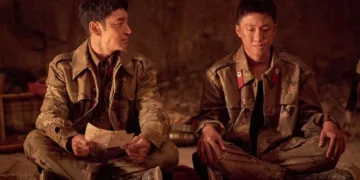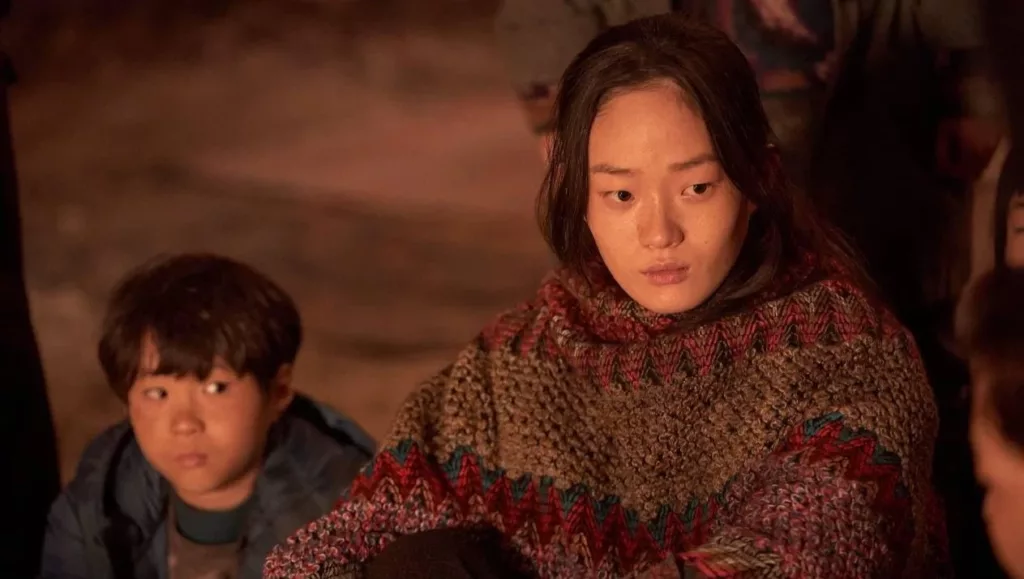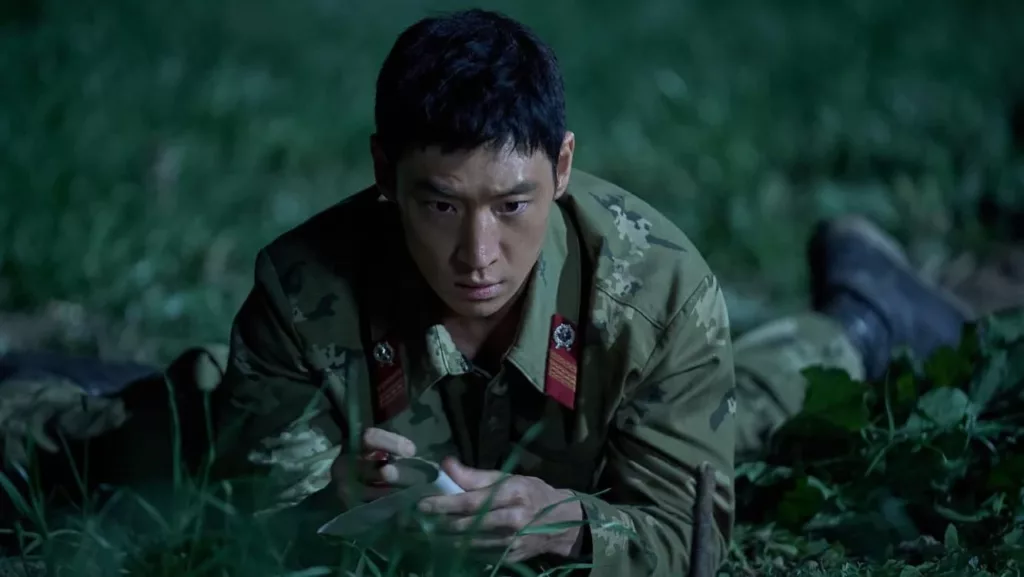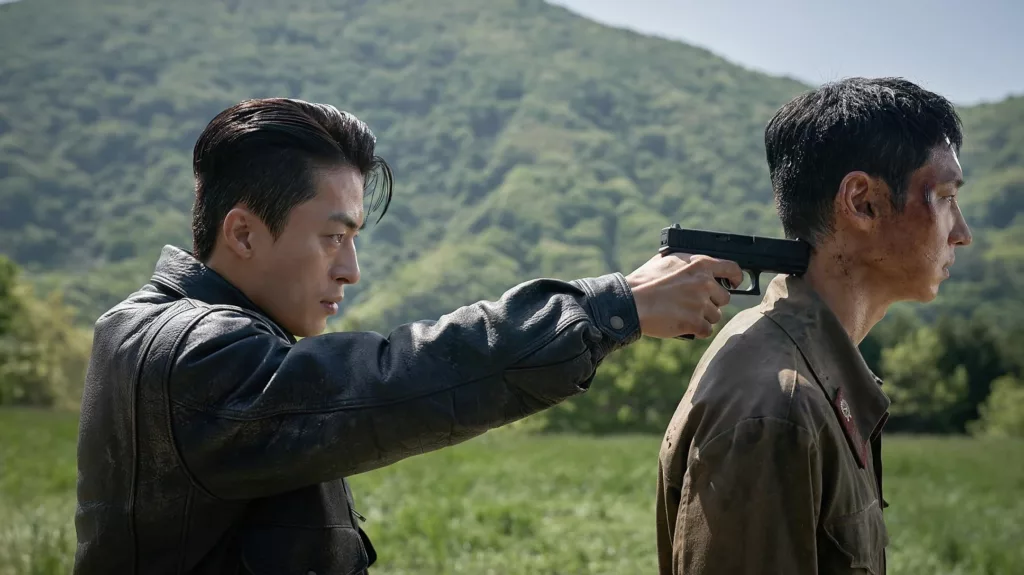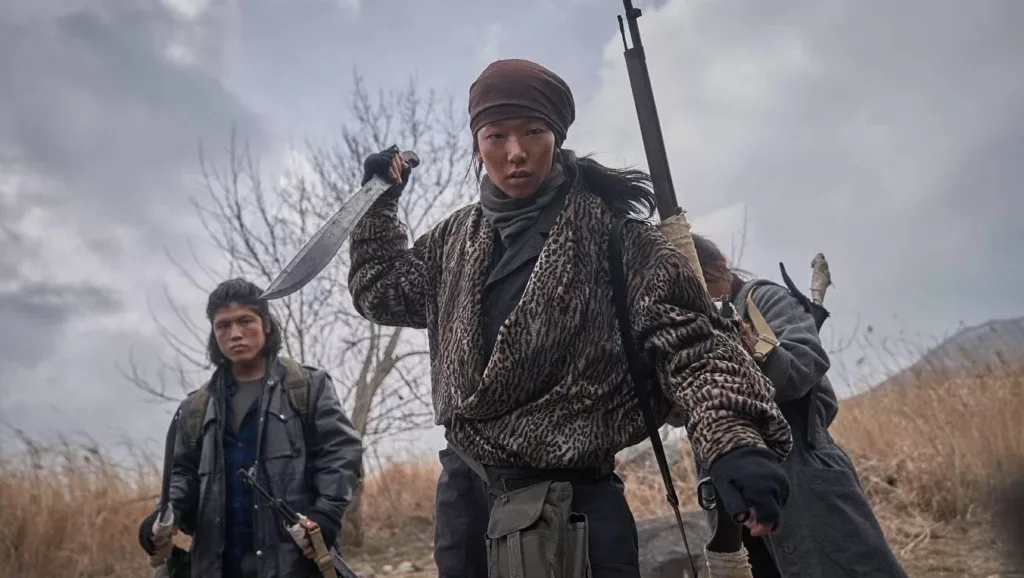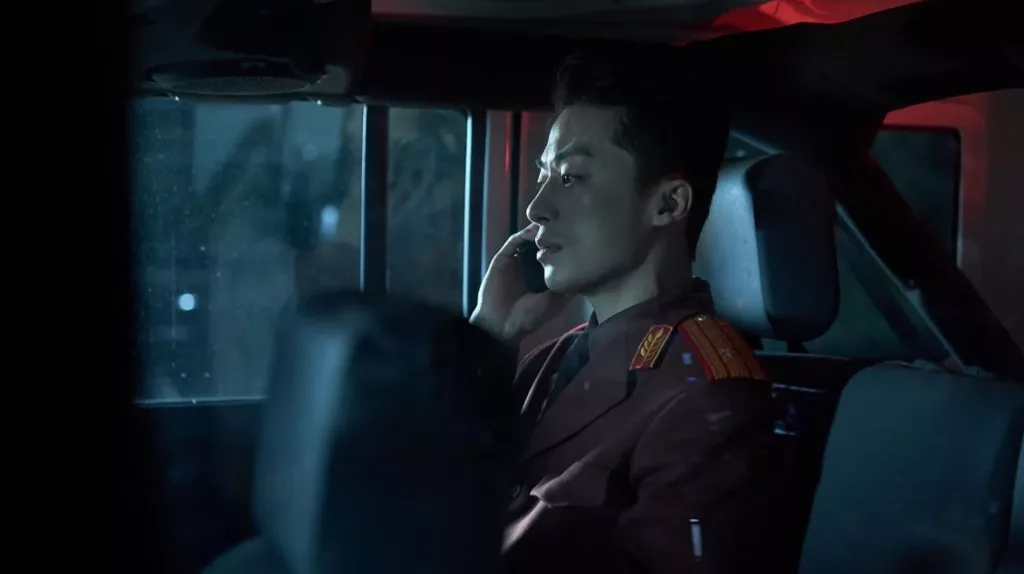They called it Escape, and what an apt title it is. This thrilling newcomer wastes no time plunging us into the desperate bid for freedom of North Korean sergeant Lim Gyu-nam. Over ten tense years, Lim has meticulously plotted his getaway across the mine-strewn border to the promised land of the South. But on the eve of his departure, a spanner is thrown in the works, endangering not just Lim’s mission but his very life.
That sets the relentless cat-and-mouse chase in motion. As Lim recalculates in the face of new obstacles, he’s hunted by the dangling Field Officer Li Hyun-sang, a captivating yet unsettling antagonist. Their childhood connection makes their conflict all the more compelling as friend turns against friend. Meanwhile, the stakes are raised when Lim’s comrade Dong-hyuk is captured, leaving Lim racing to rescue him from the iron grip of the North’s brutal regime.
Director Lee Jong-pil commands proceedings with a breakneck yet assured hand. With minimal exposition, he throws us right into Lim’s world of split-second decisions and heart-in-mouth close calls. The result is an all-adrenaline ride propelled by natural tensions rather than manipulated artifice. Lee Je-hoon and Koo Kyo-hwan lead a standout cast who bring intensity and humanity to their roles amid bleak surroundings brought stunningly to life by the cinematography.
Escape tells a story that’s persistently gripping from first frame to last, shedding light on the plight of invisible men forced to flee the oppressive system they serve. In chronicling one courageous soldier’s fight for freedom against all odds, it brings an all too real human desperation to the centuries-old conflict dividing Korea.
Characters in Crisis
Right from the off, Escape lays out Sergeant Lim Gyu-nam’s bid to flee North Korea. Over long nights plotting, he stakes a route through minefields to the DMZ. His skills and preparation seem set to deliver freedom.
But when comrade Kim tags along, hoping for the same, their pact is prematurely tested. Caught in the act, Kim accepts blame to shield Lim. Their opportunity lost, Lim’s turmoil grows as a “childhood friend,” Field Officer Li, rewards, then watches him. Beneath smiles, Li’s grip soon tightens.
Worse, Kim’s sacrifice was forged. Imprisoned, survival depends on Lim’s response. As rolling clouds threaten landmarks across the border, did tonight bring Kim’s last vision of home? Lim reconvenes under new pressure, racing to reverse fortune’s turn as Li closes in.
Twists abound. Lim and Kim’s bond endures trial, though fraying plans leave lives in jeopardy. Li’s influence proves a double-edged sword, carving opportunity but cutting deeper into the friends’ dire stake. Their mettle is tested while personal fortitude and faulty intentions clash under regime rule.
Throughout, tension crackles. Director Lee intensifies peril at each beat, leaving fate undeclared till the suspenseful end. Flaws in friend and foe emerge as humanity overrules but dictates a system built to fracture such bonds. Through it, the thematic heart of Escape—defiance in servitude, courage amid control—maintains an electric atmosphere as gripping as the chase across its mine-ridden fields.
The Men of Escape
In Escape, we find three souls bound by circumstance in a place where individuality means risking all. Each man portrays life under tyranny in his own way.
Take Lim Gyu-nam, our steady-handed sergeant. After a decade serving machines, not men, he’s carved experience like old explorer Amundsen from battered books. Now the chance to break free calls, and in Lee Je-hoon’s focused form, we see a man learned to endure whatever it takes to answer destiny’s beckon.
Then there’s Kim Dong-hyuk, clinging to hope of home through Lim’s endeavor. In Hong Xa-bin we find a youth yearning for comforts long lost, liable to act rash should chance come knocking. Their bond proves the sole solace in desolate duty, a light guiding two when all other paths fade.
Most haunting is Hyun-sang, whose hungry eyes tell of inner demons few dare face. As portrayed by Koo Kyo-hwan, this enigma revels in mastery over mere mortals, grasping for purpose to fill the voids within. Does he chase phantoms or just prey upon them—a sad soul set to stall another’s flight, if only to postpone confronting his own?
Together these titans trace life’s fragile line, where fate’s flick decides who flourishes, falls, or finds fellowship. Under pressure, personae break or bend, revealing humanity in humanity’s absence. If only flesh were stronger than the shackles circumstance cast, yet in the trials they toughen, we glimpse what spirit may withstand where all else crumbles into dust.
No Time to Spare
This film flies from start to finish. Escape wastes not a moment, hurtling from one white-knuckle scene to the next. Director Lee keeps things crackling with a sleek, stripped-back touch.
Through Gyu-nam’s trials, we’re pulled headfirst into his gritty world. With scant exposition needed, the plot propels ahead on raw momentum. All the while, cinematographer Kim lenses the action with a you-are-there rawness.
Whether following night raids across damp fields or tense confrontations in shadowy corridors, his camera places us by Gyu-nam’s side. Lit only by watchtower beams piercing inky black, the terrain comes to threatening life. Rain lashes and mud grabs as bullets whiz, keeping danger close.
Action sequences burst with ferocity yet remain poised. Choreographed like a lethal dance, each punch and gunshot lands with bone-crunching impact. But streaming cameras maintain clarity, letting visceral thrill drive tension without dizzying excess.
Highlights include a breathtaking Jeep chase along rocky trails. As the vehicle spins wildly, passengers battle on its roof in a balancing act of brutal grace. Another sees Gyu-nam sprint a bullet-riddled gauntlet, evading death by milliseconds through sheer grit.
Of course, realism can only go so far. Plenty of shots find their mark in trees instead of flesh. But such nitpicks fade against the film’s breakneck spirit. For all its flaws, Escape delivers edge-of-seat action in speared doses.
In Lee’s hands, tension seldom slackens from opening to final, do-or-die standoff. Every scene flies at the viewer with the same breakneck rhythm as Gyu-nam fleeing for his life. No time can be spared for anything but the next life-or-death choice.
Behind enemy lines
This film finds truth in tales of individual spirits facing state-sized steely wills. Escape explores life for the common man, where individuality is itself an act of defiance against regimes built to erase it.
Through Gyu-nam’s grit, we glimpse a world policed to preempt pursuit of dreams beyond duty and obedience. His flight awakens discontent dormant in souls, teaching that hope lives south of barriers and ambition ends at orders.
In these cramped confines, friendship and faith in fellow men remain rare signs of life. Bonds like Gyu-nam and Kim’s show beauty can take root even where compassion is contraband. Their story speaks to humanity’s indomitability, whatever the odds against it.
Hyun-sang’s anguish hints at deeper pains. When systems kill what’s uniquely us, don’t some monsters within feed on faces we present the world? His repression and ruthlessness beg the question—what toll does total control take on even those tasked with enforcing it?
Escape illuminates society as prison and individuals as cells, with jailers and inmates finding roles reversed come revolution. Through characters chafing against a machine tooled to break independent wills, this film’s beating heart of defiance resonates all the louder.
If art holds mirrors to its age, Escape reflects an age-old battle as fresh as this dawn’s roll call—and reminds that whatever bounds the body, spirit remains free to write its own story against whatever odds.
Beyond the Wire
Escape transports us straight to the heart of North Korea. As Gyu-nam schemes under watchtower beams, we feel the chill of life in a militarized police state.
Every detail rings frighteningly true, from barracks discipline to how “deserters” are demonized. Propaganda parades past like a nightmare we’ve glimpsed on the news. But amongst the stiff uniforms march hearts as complex as our own.
Through limitless verisimilitude, the film insinuates us into a world Americans can barely fathom. It pins us under searchlights along the DMZ, lets rain pierce our skins as bullets fly. The authenticity is staggering.
Culturally, Escape enlightens without lecturing. Region-specific references flow naturally, invoking the vibrancy present even in darkness.
A glimpse of Gyu-nam’s pop song Solace stays with me like the soul surviving amid scarcity. Such nuances humanize people reduced elsewhere to geopolitical pawns.
Some clichés surface, like the requisite hardliner hidden from his truth. Yet even here, compassion prevails—his hypocrisy stems from a system, not nature, of man.
Technically brilliant, Escape transports us beyond propaganda or preconceptions. It invites diving into unknown shores and fathoming lives beyond parallel. For showing reality as complexly human, the world seems a little smaller, and empathy a bit stronger.
To Freedom’s Shore
With Escape, Director Lee gives us a pulse-racing thrill ride across the minefields of the human spirit. Though not flawless, its virtues far outweigh tiny missteps.
Chief among its strengths lies a brilliant sense of pacing and atmosphere. From opening moments, Lee immerses us in Gyu-nam’s perilous world without brief. Captivating performances and kinetic action sustain tension to the breathtaking end.
Where characters fall flat, their importance feels minimized. Critics seeking plot holes miss the film’s poetic throb: ordinary lives crushed under dictatorship’s wheel yet finding purpose in fleeting acts of bravery.
Ultimately, escape resonates because it captures life pared to essentials, where dignity exists independent of system or station. Gyu-nam’s fight transcends borders; his defiance sparks reflections on freedom in all its fragile forms.
So while nationalistic tones may stir mixed feelings, the film resonates far beyond geography. Any soul questioning life’s hard bargains will find fellowship in its beating heart.
For those drawn to survival stories of the human spirit, Escape offers 94 minutes that fly by much too fast. Director Lee deserves praise for a tale compelling all the more for focusing on what unites rather than divides us.
In chronicling one man’s border-breaking bid, it becomes a boundary-breaking work that will stay with me to freedom’s distant shore.
The Review
Escape
Escape is a tense, well-crafted thriller that uses the intimate story of one soldier's defiance to shine a light on the oppressive realities of life in North Korea. While not without flaws, Director Lee's dynamic direction maintains edge-of-seat tension throughout. The grounded yet hopeful spirit shown by its characters makes this a film with resonances far beyond its borders.
PROS
- A taut, well-paced plot that wastes no time pulling the viewer in
- Authentic portrayal of settings and way of life in North Korea
- Heartfelt central performances that make characters' struggles resonant
- Stylish direction and cinematography that immerse the viewer
- Sustains tension and intrigue from start to finish
CONS
- Some secondary characters feel thinly written or underdeveloped
- Occasional unrealistic depictions in action sequences
- Predictable in parts with little surprise or nuance
